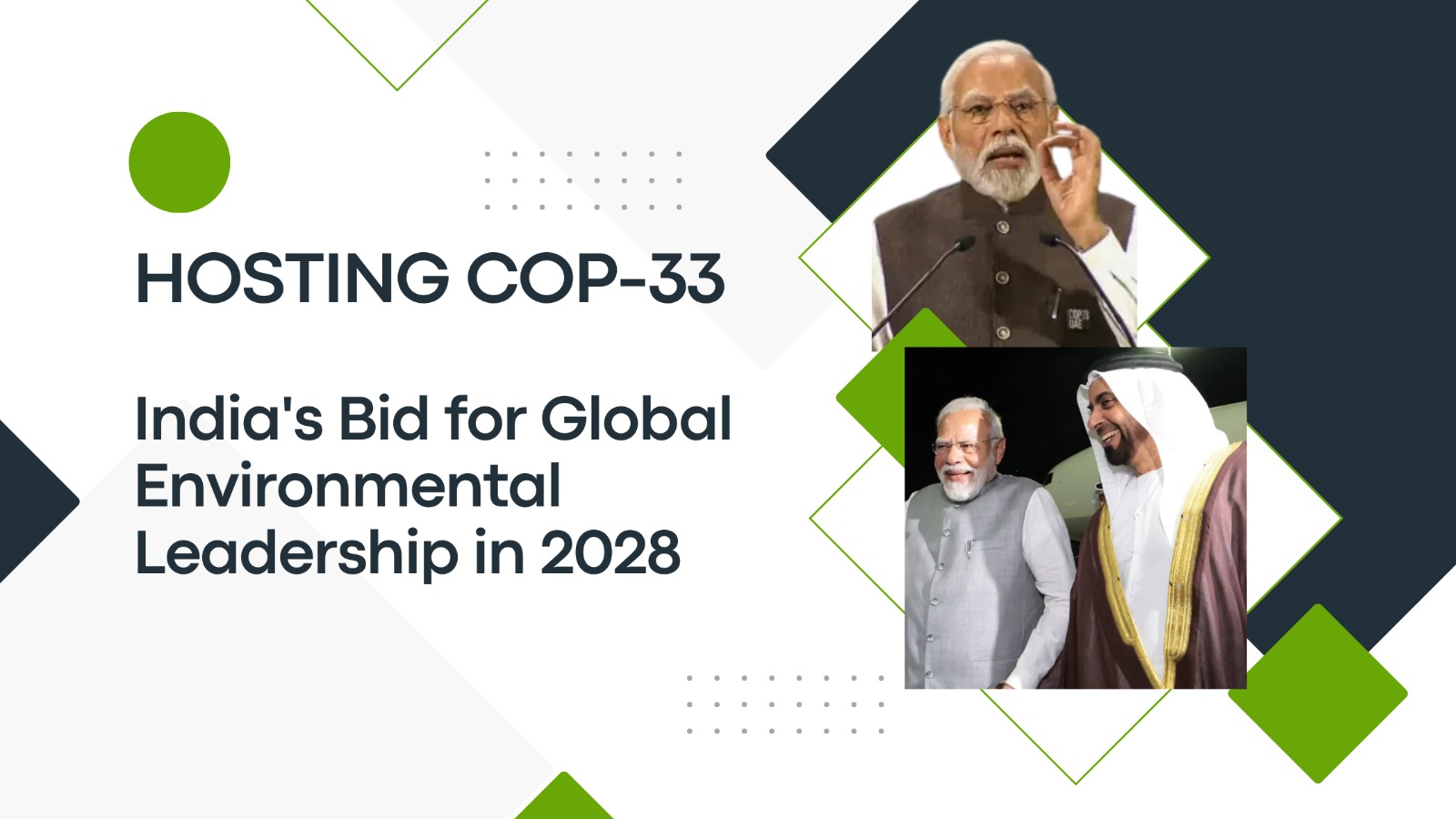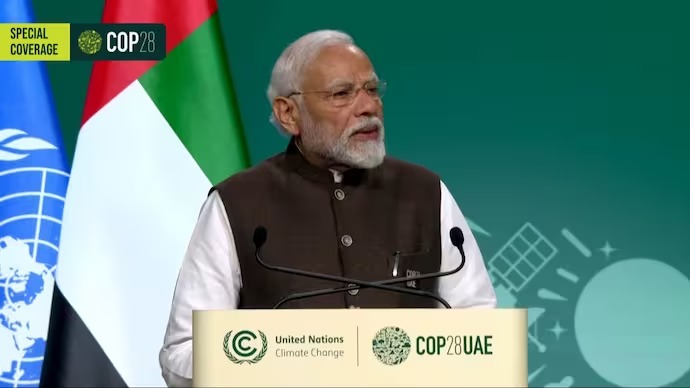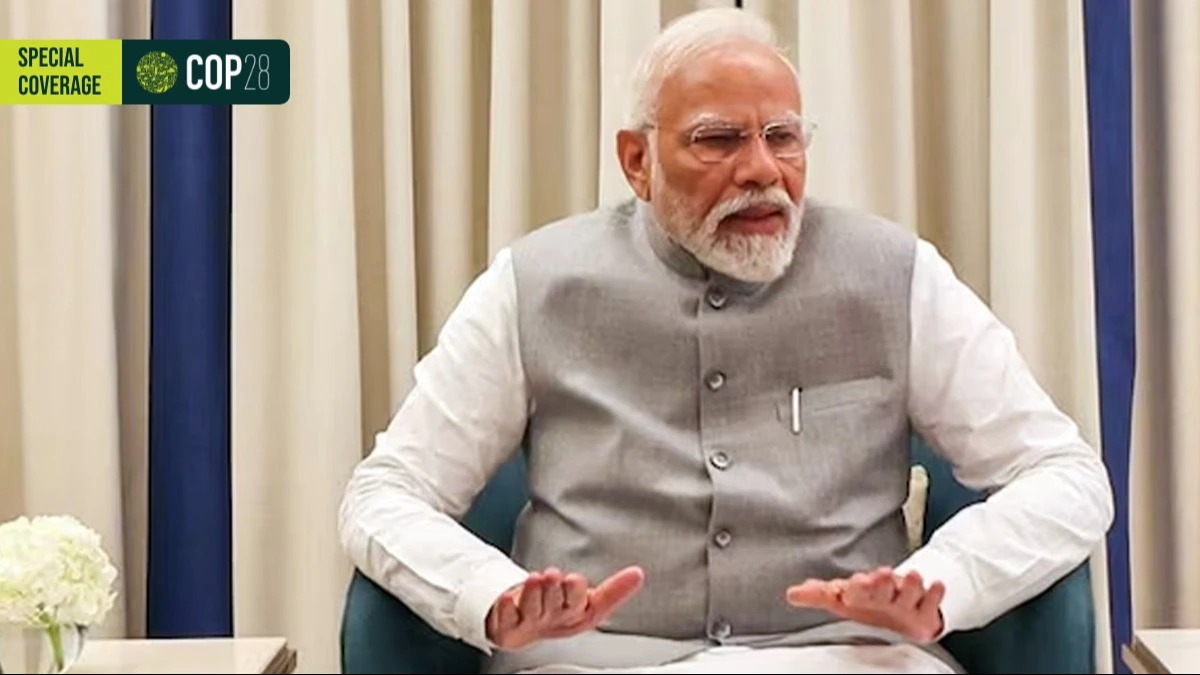
In a significant turn of events at the 28th Conference of the Parties (COP-28), held to address pressing environmental concerns, Prime Minister Narendra Modi made a remarkable announcement that may reshape the future of global climate action.
Instead of committing to new environmental targets, Mr. Modi proposed a different strategy to combat climate change and called upon developed nations to take a proactive role in mitigating the crisis.
In a significant development at the COP-28 summit hosted by the United Arab Emirates, Prime Minister Narendra Modi welcomed the announcement of the $30 billion Climate Investment Fund. Emphasizing the urgent need for concrete financial commitments to combat climate change, he called for the establishment of a new target on climate finance, referred to as the New Collective Quantified Goal (NCQG).
This goal aims to accelerate the global transition away from fossil fuels by ensuring that developed countries fulfill their commitment to providing financial support to developing nations.
Prime Minister Modi’s address marked a departure from the conventional approach of setting new commitments to curb global temperature rise. Instead, he emphasized the need for developed countries to “vacate the carbon space” before 2050. This statement highlights the importance of historical responsibility, urging nations that have contributed significantly to carbon emissions to take a lead in reducing their environmental footprint.
“In his impactful address at the opening session of COP28, PM Narendra Modi emphasized India’s unique position in global emissions footprint, constituting 17% of the population but contributing less than 4% to carbon emissions. He highlighted India’s successful model of balanced development, harmonizing ecology and economy, achieving emission intensity targets over a decade ago. PM Modi celebrated India’s early achievement of emission intensity targets, set 11 years ago, and reiterated the nation’s commitment to tripling renewable energy sources by 2023. Commending India’s progress towards meeting its Nationally Determined Contribution targets, he proposed hosting COP33 in 2028, showcasing the country’s commitment to global climate leadership. PM Modi again established his unique leadership by articulating India’s leadership position in the global climate action movement and environmental stewardship.
“A central theme of the speech was the Green Credit Initiative, a groundbreaking domestic voluntary environmental market mechanism. This initiative focuses on water conservation, clean air and afforestation, utilizing green credits as tradable commodities within a domestic market platform. PM Modi called for ‘Jan Bhagidari’ or people’s participation to create carbon sinks and rectify past environmental mistakes. Expressing gratitude for global support, PM Modi outlined a vision for net-zero emissions by 2070. He stressed the importance of protecting everyone’s rights and ensuring equal participation for the greater global good. The speech encapsulated a call for collective action and showcased India’s commitment to pro-planet, pro-active initiatives for a positive and sustainable future. We eagerly anticipate substantial progress at both the global and Indian levels during COP28.” – Mr. Manish Dabkara, chairman and MD EKI Energy Services Ltd
A key element of Mr. Modi’s proposal is India’s “Green Credit Initiative.” Described as a “non-commercial” effort, this initiative aims to create a carbon sink, absorbing carbon emissions and promoting sustainable practices. By rallying countries to join this initiative, he envisions a collective effort to address climate change without compromising economic growth.
In his address, Mr. Modi urged developed countries to prioritize the elimination of their carbon footprint before 2050. This call aligns with the global commitment to achieving net-zero emissions and underscores the need for developed nations to lead by example in the transition to a sustainable and low-carbon future.
“The Green Credits scheme sounds positive in theory but more is to be seen. PM Modi’s offer to host the UNFCCC COP-33 in five years is a good diplomatic masterstroke given the mood of the climate discussions in Dubai,” said Arti Khosla, director, Climate Trends.
One of the most surprising announcements during Mr. Modi’s address was the invitation to host the 33rd edition of the COP in India in 2028. Typically, decisions about future COP venues are made only two years in advance and require approval from other signatories to the United Nations Framework Convention on Climate Change (UNFCCC).
If approved, this would be India’s second time hosting the summit, with the first instance dating back to 2002 during the 8th edition.

(Source – https://www.indiatoday.in/india/story/pm-modi-cop28-climate-summit-dubai-india-host-cop33-2028-2469947-2023-12-01)
The 2002 COP hosted by India was a relatively modest affair compared to recent editions. The event primarily involved small ministerial delegations, and the focus was on laying the groundwork for future environmental collaborations. By expressing interest in hosting COP-33, India aims to leverage its growing influence and contribute significantly to shaping the global climate agenda.
While Mr. Modi’s proposals are ambitious and reflect India’s commitment to environmental stewardship, they come with challenges. Convincing other nations to adopt the Green Credit Initiative and gaining approval for hosting COP-33 will require diplomatic finesse. However, these challenges also present opportunities for India to emerge as a leader in sustainable development and climate action.

(Source – https://www.indiatoday.in/india/story/pm-modi-cop28-climate-summit-dubai-india-host-cop33-2028-2469947-2023-12-01)
The NCQG represents a crucial aspect of ongoing negotiations concerning climate finance commitments. The original goal, set in 2009, aimed to transfer nearly $100 billion annually to developing countries through the Green Climate Fund (GCF).
However, only a fraction of this target has been realized, prompting the need for a renewed commitment. With the $100 billion commitment set to expire in 2025, Modi stressed the importance of finalizing new financial targets to support developing countries in their climate action endeavors.
While advocating for new financial targets, Prime Minister Modi reiterated the importance of upholding existing commitments to the Green Climate Fund (GCF) and the Adaptation Fund. The GCF, established to support developing nations in their efforts to combat climate change, has faced challenges in meeting its initial financial goals.
Additionally, the Adaptation Fund, set up in 2001, has raised $800 million to create infrastructure in developing countries, protecting them from the adverse impacts of climate change. He urged developed nations not to forget these commitments, emphasizing the need for a holistic approach to climate finance.
Prime Minister Narendra Modi’s stance at COP-28 reflects India’s commitment to addressing the pressing issue of climate finance. By advocating for the New Collective Quantified Goal and urging developed nations to fulfill existing commitments, Mr. Modi positions India as a leader in the fight against climate change.
By urging developed nations to take responsibility for historical carbon emissions and proposing innovative initiatives like the Green Credit Initiative, India seeks to pave the way for a more collaborative and effective approach to combating climate change. The proposal to host COP-33 in 2028 further underscores India’s commitment to environmental leadership, setting the stage for a crucial chapter in the ongoing battle against climate change.
Charting a Greener Path: What to Expect for Earth’s Climate Odyssey at COP28
Leave a Reply